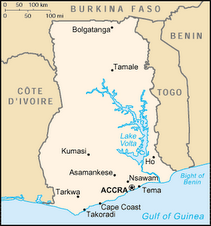Many extremely sick children arrive late in their disease due to the scarcity of health care, distance and expense of hospital treatment and a culture where they are treated by the local traditional healer. The following three cases presented this past week. A fourteen-month old came in with a history of coughing after she fell four days before. With persistent questioning, we learned the child had been eating peanuts two days before the fall and the cough was caused by a peanut which was aspirated into her lungs. Removal was partially successful and a second attempt will be made in two days. Another child had had a coin in his throat for four months. He originally went to a hospital closer to his home where the family was told the coin would pass. When the child ate poorly the family brought the child back where he was treated for ‘tonsillitis’ and sent home without an x-ray. After four months, the poorly eating child was taken again to the hospital and the family demanded an x-ray which showed the coin. The patient was finally brought to Tamale Teaching Hospital and as we removed the coin, it was thickly coated and the esophagus wall was hemorrhagic and friable. There was a danger of esophageal perforation, but the child did well. The third pediatric case, a little boy, septic and drooling, had had a fish bone in his throat for four days and developed an abscess. He is doing better.
Tragically, too many parents allow their children to place small objects into their mouths. In addition to picking things up from the ground or floor, I often see a mother buying a small bag of popcorn in order to keep her child occupied and free from crying. Better education concerning this danger is sorely needed and can perhaps be accomplished through articles in the newspapers or on the radio. In the United States, 2,000 children, between the ages of one and three, used to die annually from the aspiration of peanuts, popcorn or corn. With proper legislation and education now only 25 die annually. In Ghana, I fear the number is much higher.
Tragically, too many parents allow their children to place small objects into their mouths. In addition to picking things up from the ground or floor, I often see a mother buying a small bag of popcorn in order to keep her child occupied and free from crying. Better education concerning this danger is sorely needed and can perhaps be accomplished through articles in the newspapers or on the radio. In the United States, 2,000 children, between the ages of one and three, used to die annually from the aspiration of peanuts, popcorn or corn. With proper legislation and education now only 25 die annually. In Ghana, I fear the number is much higher.


No comments:
Post a Comment